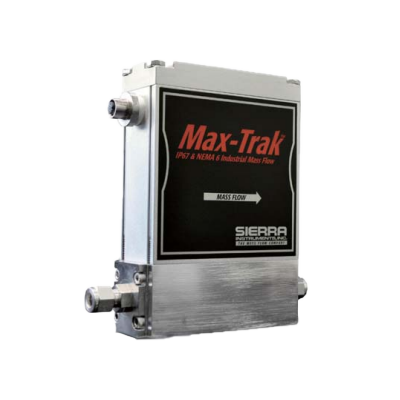What Is a Mass Flow Controller?

A mass flow controller is a device that measures and controls the flow rate of a fluid. It is utilized in process fields where advanced flow control is required. There are two types of flow rates: volumetric flow rate and mass flow rate. Mass flow sensors measure mass flow, not volume flow. Mass flow is not affected by ambient conditions such as fluid type, characteristics, temperature, etc. Therefore, it can measure and control flow more accurately than volumetric pressure.
Uses of Mass Flow Controllers
Mass flow controllers can control fluids in addition to measuring flow rates. Due to their high accuracy and stable control, they are used in various process sites and laboratories. In the semiconductor manufacturing process, they are utilized in film deposition and etching. In addition to semiconductors, a wide variety of products are used, including optical fiber, liquid crystals, and biotechnology. Laboratories also use mass flow controllers in analytical instruments to control carrier gases.
Principles of Mass Flow Controllers
Mass flow controllers consist of a sensor, a bypass, a fluid control valve, and an electrical circuit. Thermal flow sensors are often used as flow sensors. Fluid passes through the mass flow controller to the sensor and bypasses. In the sensor, a heater is wrapped around the tubing through which the fluid passes. The temperature difference between the gas flowing upstream and downstream of the tubing is converted into an electrical signal for flow measurement. In thermal mass sensors, there is a limit to the amount of fluid that can be sent to the sensor. Therefore, by diverting a portion of the fluid to the sensor and the rest to the bypass, the flow distribution ratio can be kept constant, enabling highly accurate flow control even with significant flow rates. The fluid control valve adjusts the flow rate based on the sensor’s measured flow rate. Fluid control valves use solenoid actuators, thermal actuators, and piezoelectric actuators as actuators (devices that convert electrical signals into physical motion).
How to Select a Mass Flow Controller
To select a mass flow controller, you need information on the gas type, maximum flow rate, and working pressure requirements. Mass flow controllers are calibrated for specific gas species, so they cannot accurately measure different gas species.
In the case of corrosive gases, you should choose sealing materials and other materials with high corrosion resistance. Since the flow control range of mass flow controllers is generally 2-100% of the maximum flow rate (F.S.), you should select the maximum flow rate that matches your application. The flow control valve used in mass flow controllers adjusts the flow rate by valve opening, so a pressure difference between the primary and secondary sides is required. Generally, a pressure difference of 50-300 kPa is considered appropriate, but if the pressure difference is too large or too small, the flow rate cannot be adjusted correctly. Additionally, consider the temperature to be controlled and the fittings in your selection process.